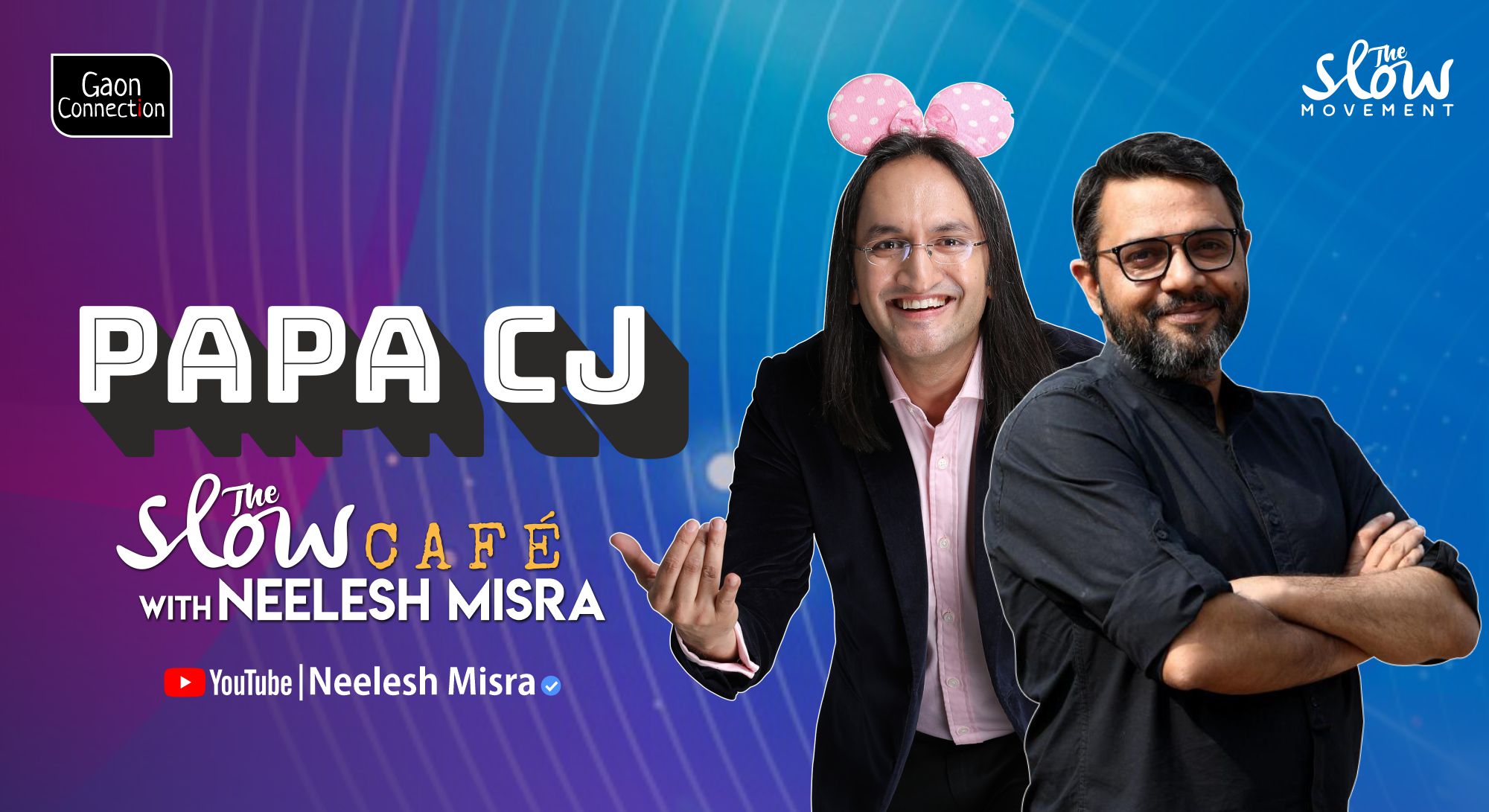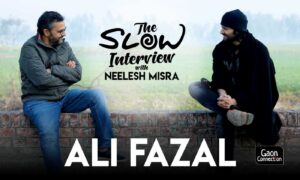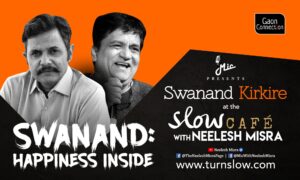You normally expect a conversation with a standup comedian to leave you clutching your stomach after a laughter spasm. What Neelesh Misra’s The Slow Cafe with pioneering stand up comedian Papa CJ did was make you think, possibly wipe off that stray tear and reinforce the concept of how the best laughs come from a place of great pain.
In the first few years of the new millennium, a young CJ was handling a corporate career and a budding romance, when things went South. He thought the young couple was taking a break — he saw minor arguments, she saw incompatibility. And his heart broke into a million pieces. He put together those pieces back, but there were gaping holes, spaces that belonged to a life with her.
And so, CJ set out on a journey, amid what he says are sure signs of clinical depression, every single night. He travelled out of London to take part in open mics. By the end of the year, he had no work, no savings, no friends, no relationships. But every comedy promoter in the country knew him by name!
Something usually happens to guests on The Slow Cafe. At first they are hesitant to speak about struggle and life in detail, unused to being allowed that space to breathe in hurried conversations. They move from Point A to Point F, leaving out all the intricacies of the alphabet in between. When Misra told CJ to focus on the missing letters, we got the story of his mother and father.
Of a couple who trekked up hills and even to the Everest Base Camp after their 50s. Of a father who is 72 and loves bike rides and white water rafting. Of how, during a course at the Himalayan Mountaineering Institute, his father saw a gentleman ride a horse into the sunset, found out he was a tea planter, and decided to become one.
At 21, in 1970, he carried a hold-all, took a train to Assam and became a planter. He married a girl from Bombay who decided the jungles were not for her, and they moved to Calcutta. Once there and working with Goodricke, CJ’s father figured how to get an army of women to create a demand for the tea they made, because competing with the giants for shelf space was getting difficult. They would hit random petty shops and keep asking for this brand of tea. Eventually, the shopkeepers were forced to ask the company to supply the tea.
“I want to be like my father, but I am my mother. She’s an excellent performer, the life of a party; he’s the storyteller who whispers,” said CJ, who has performed over 2,000 shows in 25 countries.
Speaking of his memoirs Naked, which was released in late 2019, he spoke of where his humour came from, and where it all began — Upper Assam, Kolkata and the UK. “Calcutta is beautiful. The return on nostalgia is very high. Nothing changes,” he laughed. “Time stands still, and it is a beautiful place to call home. The people are warm; they have time for you.”
In his initial days in the UK, studying in Oxford with people old enough to be his father, CJ grew as a person. He got a job, paid off loans and then took a year’s sabbatical. That’s when he discovered the Edinburgh Festival Fringe, the largest art festival in the world, with over 3,000 shows a day. “I saw a standup comic, and realised that he was having fun with a mic in hand, and that this was his job too. What could get more amazing? In three months, I began doing stand up.”
CJ derives inspiration from everywhere. He broke his wrist and leg in an accident, and wrote a 90-minute show called Unbroken! “This gives you the magical ability to find positivity in the world,” he said. Even his acclaimed show Naked, after which the book is named, leaves some in tears, because it is an emotional roller-coaster. “It connects with people; I speak about my life, but that’s something everyone experiences,” he said.
Misra said that as storytellers, every day, one becomes the other. CJ agreed and said that that allows them to see the world through someone else’s eyes. CJ spoke of the time he was completely out of his depth (Laughter Challenge) and how he learnt from open mics. “Sometimes, there would be five people, sometimes three hundred. But, I learnt.”
During that phase when he was heartbroken he wrote a poem for the person who was no longer with him. Nothing full of metaphors, but more about unfinished cups of tea and the side of the bed that missed its regular occupant. When the storyteller with the magical voice Misra read it, you felt the pain in CJ’s heart. “That year, comedy was the only thing that kept me alive. I’d wake up at eleven in the morning, leave home in the evening, and return at five am, sometimes changing three buses and spending forty five minutes in a cold London bus stop.”
He took up a part-time job soon and did 700 shows in three years. All this while his parents did not know what shape he was in — he never told them. In 2009, he moved back to India, and in 2009, he started Shaken n Stirred, an English comedy circuit in Delhi.
Speaking about audience evolution and the evolution of the artiste, CJ said that everyone evolves with time. “I might not have known better ten years ago, now I do. You initially go for the easy jokes, the stereotypes, and then you move to intelligent humour. You learn that you might get a few laughs by using cuss words in Hindi, but you have to move on… when the audience evolves, the artiste has to. Unfortunately, when one set of audience is replaced by another who likes the same thing, there’s no pressure on the artiste to change,” he explained.
Standup humour, he said, is the outward expression of an inward journey. And so, it takes a while to get there. But, one must persist. CJ recalled how during a show in Canada in 2009 he was at a venue where everyone was smoking marijuana. “Every time I cracked a joke, there was silence. It took some time for them to figure that it was funny.”
In between all his mentoring work and standup shows, CJ headlines the Happiness Project, where he does his bit to make lives happier. “It is my way of bringing joy to as many people as I can, be it through public shows or one for a private audience. I’ve gone to hospital rooms and homes and performed for those unwell. I’ve met people in different cities, to just talk to them, to let them know they have someone to talk to,” said CJ.
And then, he went on to narrate a poignant story of an elderly lady who had been amputated recently. “I went to her home, and performed for seven people. And told her that my charge for the show would be that she would have to send me a smiling photo every morning. Her son told me I’d extended her lifespan, because she finally wanted to see how she looked in the photo!”
This, he says, is the responsibility of a communicator, to bring people together in a warm circle of sorts. “Being a celebrity is a currency, and what matters is how you choose to spend it. This is how I spend mine,” he signed off.



















